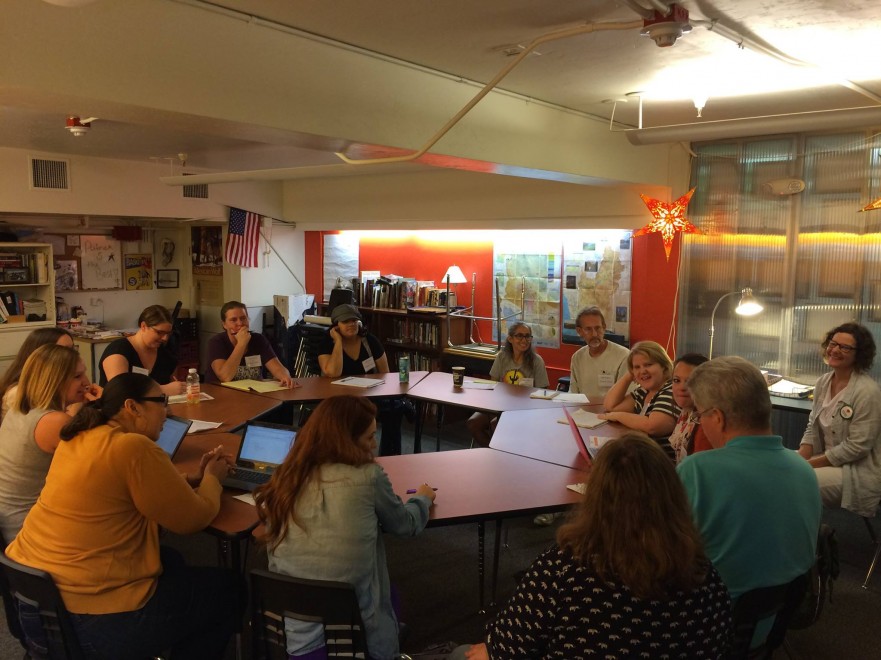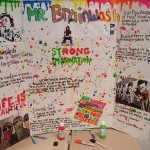After twenty-plus years working in schools, I’ve done it all….almost. I’ve taught various subjects and several grade levels; served as a school principal and college counselor; had my share of hard talks with parents and students; and delivered commencement speeches. The one constant through all of these experiences has been collaboration. Whether I am grappling with a disciplinary decision or planning my next project, I seek out the insights and perspectives of the people I trust the most: my colleagues. But there is a type of collaboration that, until this year, I had never experienced: team teaching. This year, I spent every morning with 44 students and a colleague, team teaching an integrated course that is required for all seniors. Collaboration is no longer something that I opt in and out of; it is now the center of who I am as an educator.
The National Center of Time and Learning developed a “Framework for Assessing Teacher Collaboration” that includes four key principles of effective teacher collaboration: time, collaborative meetings, leadership and support, and clear goals. Most of us that have been in schools for long enough know that with all the time and structured meetings in the world, we don’t always experience true collaboration. We might have leaders committed to collaboration, early release time, and data team protocols, but we often walk away from those meetings feeling just as alone in our professional struggles as we did before the meeting.
So what’s missing? After only two weeks of team teaching with my amazing colleague, I’m learning that true collaboration has more to do with the mindset of the collaborators than it does with any structure or mechanism that a school puts in place. I’d suggest that there are two additional key principles, or habits, required for true collaboration. They include:
Humility: As educators, we are already familiar with the need to adjust our plans to be responsive to students in our classrooms. Collaboration with other colleagues takes that need to a whole new level. The quick decision-making reflex that many teachers develop in the classroom might need to slow down in order to make room for your collaborator’s insights. In true collaboration, you may need to know less and wonder more. Skilled teachers, if they are fortunate, generally have a fair amount of autonomy when it comes to lesson planning and unit design. It’s not always easy to change those plans, especially when you’re certain that your plan is the best one. But true collaboration requires you to regularly do just that and requires a belief that, as collaborators, you are greater than the sum of your parts.
Vulnerability: Even the most seasoned teachers have their hard moments. Oftentimes, teachers can retreat to the privacy of their classrooms to experience those challenges alone. The richest collaborations require that each person come to the table willing to share their most challenging moments knowing that their colleagues will be supportive and empathetic. True collaboration means that you are not always the expert and that you are willing to accept the fact that you may have a few blindspots. This assumes a social contract of sorts. I will only share my most troubling issues as a teacher if I know you are committed to doing the same, and we will do so in the spirit of trust and what is best for our students.
As mentioned earlier, no amount of time or space will ensure that these habits of humility and vulnerability are practiced, but it is possible to create a school culture in which both are practiced and expected as a regular part of each day. Teachers and school leaders can develop these habits by looking at student work together, sharing challenging dilemmas with each other, and being brave enough to occasionally say to a colleague “I don’t know how to do this. Can you help me?”










Comments 7
I’m in the same position – team teaching – for the first time and I think you’re exactly right on your points. As I read I kept thinking, She needs to add… and then you did. Plus, the points about humility and vulnerability can’t be understated. I’m fortunate that my teammates and I share those qualities – although it seems funny to claim that you’re humble. Thanks for this post.
I really enjoyed this quote: “In true collaboration, you may need to know less and wonder more.” Super cool. You’ve done a great job to expand the framework with more authentic qualities from real life experiences. Thanks for giving me a window into your work and what makes it successful!
Your insight about sharing our most challenging moments with our colleagues resonates with me. I used come home and try to explain a work problem with my husband, who crunches numbers in finance with fellow adults all day, and he attempted to provide advice and support. However, even with his kind heart and listening ear, he did not get it the school environment and even worse he did not understand the high school student brain. I often felt more frustrated after talking. So one day I simply stopped telling him. Instead I decided to wear my heart of my sleeve and tell my fellow teacher buddies about all of my mistakes. While i expected some support and empathy, the actual amount astounded me. With every silly problem I had, another teacher had their own story to share. By reaching out to colleagues, my mistakes became my learning experiences. Thank you for sharing this and reminding us to bear our hearts!
My school is working on becoming a PLC this year. I know, we’re late to the game, but we are committed to real collaboration led by teachers. Today we met in our newly designed library to develop professional goals. We have done this by ourselves without meaning for so long. It was pretty cool today to watch teachers have deep discussions and ask one another for help in developing their goals. I would agree, that it could not happen without humility and vulnerability which some times is difficult to have in teaching.
Ok. I am sharing this one with my school. You hit it right on the head! We seem to have the knowledge of collaboration, but not the understanding. I greatly appreciate your openness and willingness to say the things that need to be said, in a way that is easy to receive. Well done!
Well said Eve!! “no amount of time or space will ensure that these habits of humility and vulnerability are practiced, but it is possible to create a school culture in which both are practiced and expected as a regular part of each day….” True collaboration is so significant for transformation and real change in a school culture that it cannot be underestimated. Great post!!
Truth!!! I team-taught for a couple of years, and WOWZA, it’s like being married!! Seriously!! Communication is so critical. We had to talk before school, during school, and after school… no matter how tired or frazzled or sick of each other we were. It’s probably one of the most challenging positions a Type A intravert could ever have. (Referring to myself, lol).